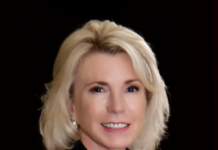Catalina Valentino Podcast Transcript
Catalina Valentino joins host Brian Thomas on The Digital Executive Podcast.
Welcome to Coruzant Technologies, Home of The Digital Executive podcast.
Brian Thomas: Welcome to The Digital Executive. Today’s guest is Catalina Valentino. Catalina Valentino is the group CEO and Co-founder of ELIXR. ELIXR is the world’s first global giga project and as part of its planet 2030 vision is developing technologies aligned with the UN SDGs across major verticals such as infrastructure planning, decarbonization, energy and data, education, democracy, manufacturing and industry and more to create the world’s first smart nations.
She is also a Senator and member of the Smart Cities board. To WBAF special advisor to the UK business council for sustainable development and board advisor to Uni Terra VC. Catalina has also been accoladed young entrepreneur of the year 2022 and Global top 100 Women in Tech 2023.
Well, good afternoon, Cat, welcome to the show!
Catalina Valentino: Thank you so much for having me back, Brian!
Brian Thomas: Absolutely. I love this. I don’t always get guests back on the show, but I’ve had a few and what’s great is they’re always doing something exciting and innovative and our audience lives to hear what’s going on in their lives, whether it’s been a year or two, but again, appreciate that.
Catalina Valentino: Absolutely. Well, I’m excited to share what I’ve been up to since then.
Brian Thomas: Absolutely. Let’s jump right into your first question, Cat. As the group CEO and co-founder of ELIXR, can you tell us more about your vision of the company and highlight some of the technology?
Catalina Valentino: Absolutely. So ELIXR is focused on smart cities and often it gets, you know, it’s not exactly a clear perspective when it comes to talking about ELIXR because there’s so many different verticals that come into it.
So ELIXR is, the easiest way to describe it is it’s a group of technology companies. And currently we’ve got about three in the ecosystem. And we are creating a series, maybe about 10 to 15 over the next decade or so, which will all address key sectors and integral parts of smart cities. So, whereas there are a lot of individual solutions out there, focused on smart cities, what we’d like to do is bring together solutions that focus on waste management or they focus on infrastructure and these key parts of the foundation of smart cities, but people don’t realize that there are layers to smart cities. The baseline is the infrastructure and, you know, systems that come with that and energy and ability. But then what happens after that?
Because ultimately, the reason we build smart cities is not just for environmental impact, but also social. So how does this all return to human benefit? And so, what we then added, so aside from looking at things like infrastructure or energy and data and so on, so forth, we’ve then looked at, okay, so we want to create a technology around health.
We’ve created one around education. We’ve then gone into looking at what about entertainment? Because how do we bring people into cities and how do we create places? Because it’s not just around creating a city, which. You know, it doesn’t have a heart and soul to the place that draws these people in, including tourists as well.
It’s then how do we actually look at this as a, as a further plan and vision over a period of time, rather than just focusing on the now and creating profit. Now it’s looking at how do we spread more profit ironically over a longer period of time, 25 years, 50 years, a hundred years, but actually also purpose driven as well.
And that’s where the real. New generation of companies, I’ve really seen there’s a, there’s a shift in that. There’s a lot of purpose driven companies now, which are starting to emerge with these new generations, which is really nice to see. And so just to highlight some of the individual technologies, just to answer that question as well.
One of those is Metaconnex. Metaconnex is an urban master planning tool, which utilizes digital twins and data. And what it does is we are able to. Work with councils, local authorities, states, and we can ingest local plans. We can then build and get approvals for planning in the game, essentially in the technology.
And you can walk around almost like SimCity is what we like to describe it as you can walk around. You can comment in real time on different projects that you’re working on and you can feed back quicker, which means all of these different independent pieces, as well as the data, as well as the, as the accessibility point, you All of these different things mean that we can accelerate planning from what takes roughly 18 months to maybe three, maybe just around the three month mark.
And so that’s fantastic in itself. We’ve got a case study with Bolton in the UK, actually, which of all places, people laugh because it’s just such a. Such a unique place to go first, but they were ready for the innovation. And what we did was we were able to prove that we can add half a billion of GDP onto one site using our tool in three days.
And that’s just the first case study that we’ve ever worked on. We’ve since worked with a few other councils. We’re looking at the Middle East as a huge part of what we do, because obviously they’re so focused on smart cities, and then the US and so forth. So hopefully that sheds a bit of light onto what we do.
Brian Thomas: That’s amazing. Thank you. And I do like you highlighting some of the things around looking at companies and of course it’s a profitability purpose, social impact, some of the things that you highlighted early in the conversation. But again, you jumped into a little bit of technology and how you’re helping businesses sustain their long-term viability in the market.
And of course, that social impact is always important. So I appreciate that. And Cat, you have been recognized as young entrepreneur of the year in 2022 and one of the global top 100 women in tech in 2023. How have these accolades influenced your career and approach to leadership?
Catalina Valentino: This is always an excellent question because sometimes, you know, I mean, I didn’t know how much impact these types of things could have.
I just thought, “Oh, you know, it’s a nice sort of ego boost”, but actually it helps with credibility, especially as you know, obviously I started out very young in what I do and so. It helped to give that credibility. It also helped me to build a stronger profile and therefore stronger network as well.
And it made it easier to get into certain doors as well. You know, being recognized as the top of anything in your field gives you a little bit more credibility, which really helped me actually. And the same goes for some of my qualifications as well. I mean, I know it’s quite rare for entrepreneurs to actually have qualifications, especially these days, but that’s something that I like to do in the background as well.
So, You know, when I got my master’s degree, that was a really great milestone. Obviously, you know, you can put all sorts of words after your name, but it’s more of a case of being so young. A young entrepreneur is challenging because you don’t really have a huge track record. When you can demonstrate that you have.
You know, certain skills or that you’ve passed certain criteria like a master’s and now a PhD, which I’m working on, on smart cities and sustainable engineering, you know, whether we like to admit it or not, these things, they make a difference. We micro analyze everyone that we meet to see how much we can trust them in their ability to do what they say they do.
And so, these accolades make a huge difference on the way we’re perceived and therefore how easy it is to get into certain rooms and. We all know that it’s about who you know, not always what you know.
Brian Thomas: Thank you so much, Cat. We’ve seen such a transition in what you’ve done. You’re always multitasking and the credentials that you recently added obviously helps. And again, we’ve seen such a transformation in you and what you’re doing since you’ve been last on the podcast.
So, thank you, Cat. You have spoken on global stages such as Forbes and TEDx. How do these speaking engagements help you in driving the mission and vision of ELIXR?
Catalina Valentino: Well, it kind of ties into what I was just saying about the accolades, and they give credibility as well, when even you’re able to say that you spoke on certain stages, it gives a sort of perception that you are good at what you do.
And so that’s really, really been quite helpful, actually, just from a credibility point of view, and even just putting it out onto LinkedIn and so on and so forth, you know, that really helps to drive other opportunities. People have seen me at these events, and they reach out or it helps to drive more speaking opportunities, which again, raises the profile.
Of the company or of myself, and actually sometimes when you go to these events as well, it’s not just about going to the event and speaking on the stage. It’s what can you do outside of that or around the event? Who else can you meet whilst you’re there? Because whilst it’s great going to speak on stage, what is the ROI?
And as a company, as an entrepreneur, as anybody really, you want to look at what the ROI is. And so, what I do when I go there is, I obviously make very good friends with whoever it is that’s been so kind as to invite me to speak. So usually, it’s like an event producer or somebody and they have access to everybody else who will be speaking at the event.
And so, I think you see where I’m going with this. They can make introductions that are relevant to your company. And so, whereas most people see it as a very linear thing. You go there, you speak on stage, you come off stage and then you leave. I see it as a whole strategy for business development. And so, I go and I speak on stage, but what happens after that?
People see me on stage, people approach me afterwards. If I get a really good slot, which, you know, over time, as you do more and more talks, you know, you ask a main stage or you ask for a specific time and date. You know, you want to be there on day one and day two, not the last days when everyone’s sort of leaving, you know.
And so over time, you start to realize that there’s more of a strategy to this. And I usually ask the event producers to introduce me to three to five people who can make a real difference for my business.
Brian Thomas: That’s awesome. I appreciate you highlighting everything you do in your businesses. There’s some thought behind it.
And strategy is certainly one of them. And, and I appreciate that because a lot of people kind of go into that looking at a little bit differently, like it’s just a check box to check whether it’s their bucket list or whatnot, but I appreciate that. I really do. Cat last question of the day with your background in various high impact roles, what advice would you give to young entrepreneurs in women in tech who aspire to make a significant impact in their fields?
Catalina Valentino: One of the things that I don’t hear many people talking a lot about, is making friends. I think a lot of people have it in their heads, especially when coming into the corporate or coming into entrepreneurship or whatever it is, they feel that they have to act professionally, too professionally. There’s a line, there’s being professional and acting, you know, and having manners.
That’s one thing, but actually you don’t have to be this rigid corporate machine. You know, you can have a bit of a laugh with somebody, you can have a bit of banter and you can, you know, you can make friends with people. I think that’s what’s really. Got me to, to where I am luckily, and obviously there’s still so much more to do.
You know, I’m not even remotely sort of where I want to be just yet, but I’m really glad that what has propelled me to where I am right now has been making friends. And my co-founder is the same as well. Actually, he just lights up rooms when he goes in. And so, what we do quite well is when we have meetings with people.
You appeal to their more personal side and you, you know, you remember things about them. And it’s something that naturally I do quite well, but actually I’ve also taught myself on top of that to try and really remember people’s sort of lives. And so, one of the things that I started doing only as of this week, funnily enough, which was something I just thought about was, you know, when you’ve got your contacts list and you’ve got like, I don’t know, John Smith in your contact and you want to do business with him.
What I would do is. You go into it, you can actually, there’s a notes section for the contact. So, I would then put a few bullet points as to likes, dislikes. inside jokes, whatever that might be so that I remember it for the future. Naturally, I do remember a lot of these things because I do like to make genuine friends with these people, but it would be good if that’s not something that comes so naturally to make a note of these things in the contact, which is just a game changer.
So, I’d love to start doing that more. And I’ve only started doing that as of last week, but making friends with these people unlocks things. Really genuinely does. I mean, I made friends with Dr Ingrid, who’s fantastic. She, you know, whilst it was more of a professional relationship, we still made very good friends.
And then she recommended me to be the top 100 global women in tech, which is the list that you mentioned earlier. And obviously got that, which was fantastic. And without all of these different friends in different places, I wouldn’t have had introductions to certain people, which have then resulted in million-pound deals, or in this or in this.
And so, one thing that I could ever say to anybody, because I don’t think that I could ever give anybody advice, because everybody’s journey is so unique, and we all have different skill sets and so on, is make friends. People are so scared to go into rooms, you have to be professional, shake their hands, great.
What you really want to be doing is making sure that they like you. Cause people want to do business with people that they like.
Brian Thomas: Absolutely. I love you highlighting that you’ve learned so much in your short tenure in your career as an entrepreneur, et cetera, but I just love that because we’re going to get this message out to a broad audience globally.
And we would like to highlight some of the success stories that you’ve had in the networking, how people have jumped into help and, and mentor you in some cases. So, I really appreciate you highlighting some of that. And Cat, it was such a pleasure having you on today. And I look forward to speaking with you real soon.
Catalina Valentino: Oh, me too. Thank you so much, Brian. And thanks to anyone who might’ve listened to any of my earlier episodes. It’s lovely to be reacquainted.
Brian Thomas: Absolutely. Bye for now.
Catalina Valentino Podcast Transcript. Listen to the audio on the guest’s podcast page.










